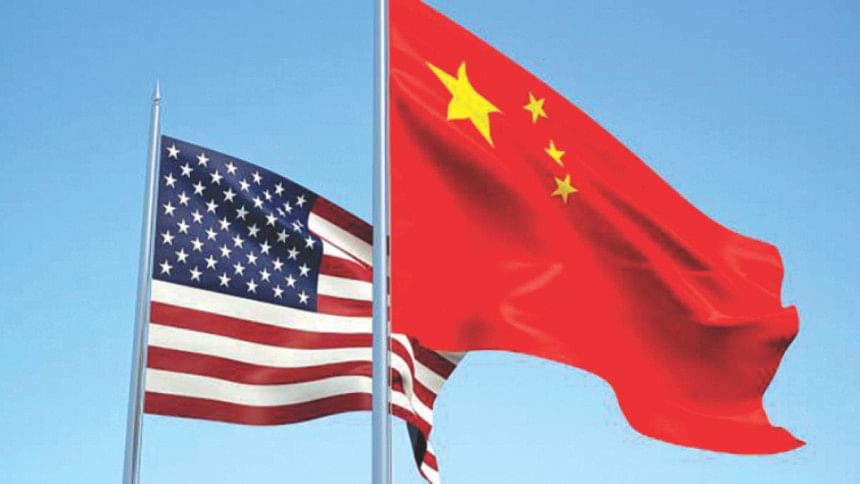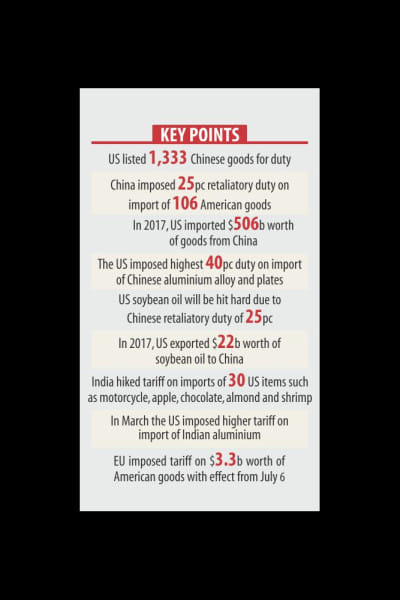Bangladesh looks to long-term gain


A prolonged trade war between Beijing and Washington could benefit Bangladesh as factories from China could relocate to the country in order to avoid higher tariff on exports to the American markets, said economists and businessmen.
The gain will widen further if the Trump Administration slaps higher tariffs on Chinese goods such as apparel as Bangladesh is already a strong player in the global garment business and also in the US market, they said.
“The imposition of higher US tariff on Chinese apparel items means a good opportunity for Bangladesh,” said Mustafizur Rahman, a distinguished fellow at the Centre for Policy Dialogue.
Being the largest exporter, China supplied $27.03 billion out of the total $80.28 billion worth of apparel items imported by the US in 2017. Bangladesh's share stood at $5.06 billion, according to data from the US Department of Commerce.
Also in the short-term, Bangladesh will benefit to some extent from China's retaliatory 25 percent duty on imports of US cotton as there will be a supply glut of the white fibre in the international markets, Rahman said.
However, the trade expert is cautious about the negative impact of the trade war between the world's two largest economies as Bangladesh has a significant stake in the international market.
For instance, the trade war might increase the cost of production of consumer goods and daily essentials that might affect the purchasing power of people worldwide.
“If it finally happens, the sales of consumer goods will decline significantly and the export from Bangladesh, particularly the shipment of apparels, might be affected,” said Rahman.
He said the trade war has challenged the multilateral trading system, which is rule-based and better for countries such as Bangladesh. “As a result, smaller trading nations will be affected by the trade war,” he said.
Ahsan H Mansur, executive director of the Policy Research Institute of Bangladesh, said there is nothing for Bangladesh to cheer up now. “We need to take preparation to gain from the global trade war.”
He said US-bound Chinese work orders might come to Bangladesh in future. “However, such a trade war is not good for a healthy global economy,” the former economist of the International Monetary Fund said.
Asif Zahir, director of Ananta Group that sends 40 percent of its $250 million worth of garment exports to the US every year, said it's too early to comment on the real impact of the trade war.
“It is a general observation that clothing retailers and brands are trying to move away from China to other destinations like Bangladesh as the cost of production in the country is too high,” he said.
Ananta Group mainly exports denim trousers to the US.
“Apart from China, buyers are also trying to relocate their clothing business from Vietnam because of the higher cost of production,” said Anwar Ul Alam Chowdhury Parvez, a former president of the Bangladesh Garment Manufacturers and Exporters Association. “So, we have to get ready by expanding our capacity. There is a chance to gain from the trade war,” Parvez said.
AK Azad, managing director of Ha-Meem Group that exports more than $300 million worth of garment items to the US, also said his company has not felt the impact of the trade dispute in the American markets yet.
Citing a survey, US-based National Retail Federation last week said tariffs on $50 billion worth of Chinese imports would reduce the US gross domestic product by nearly $3 billion and lead to a loss of 134,000 American jobs.
Tariffs on an additional $100 billion of Chinese imports would bring the total impact to a $49 billion reduction in the GDP and the loss of 455,000 jobs, according to the study.

 For all latest news, follow The Daily Star's Google News channel.
For all latest news, follow The Daily Star's Google News channel. 



Comments